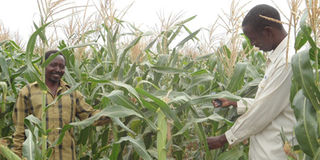Hybrid seeds cannot fight maize virus, study warns

PHOTO | FILE Maize farmers harvest their crop.
None of the commercial maize hybrids on the Kenyan market can withstand the dreaded maize disease that has wreaked havoc in Rift Valley.
Tests done by research organisation, the International Maize and Wheat Improvement Centre (CIMMYT), on the popular maize breeds found all were susceptible to the Maize Lethal Necrosis Disease, which has destroyed hectares of farmland under the crop, threatening the country’s fragile food security situation.
“This is a real threat to food security and the very existence of seed companies because the latter will be left with no quality seeds to sell to farmers if something is not done fast,” said Mr Stephen Mugo, a maize breeder at CIMMYT.
The disease has no cure and when it strikes the maize plants have to be uprooted and burned.
Maize is the leading staple crop in the country and the performance of the agricultural sector is measured vis a vis maize production.
On average, Kenya consumes 3.72 million bags of maize, 667,500 bags of beans and 940,000 bags of wheat every month.
The national maize stocks as at June 30 stood at 12,180,686 bags, with farmers holding about 7,566,000 bags, traders 1,880,910 bags, millers 461,215 bags and National Cereal and Produce Board 2,272,561 bags, according to the latest food security update by the Ministry of Agriculture.
Kenya relies heavily on imports to supplement local maize production, which has been outstripped by demand. The total imports from the EAC between July and September is expected to be 450,000 bags, while those from outside the region is projected to reach 100,000 bags.
Kenya Seed, the company mandated to research, develop and make available certified seeds, says the disease caused by a combination of viruses, was first reported in Lower Longisa division of Bomet District in September 2011.
“Later it spread to the neighbouring districts of Sotik, Konoin, Chepalungu, Trans mara, Kisii, Bureti, and Kericho. The disease has moved to other parts of the country where it has attacked the maize crops in Nakuru, Naivasha, Rumuruti, Imenti South, Embu and Kibwezi,” the company said in its latest news update.




